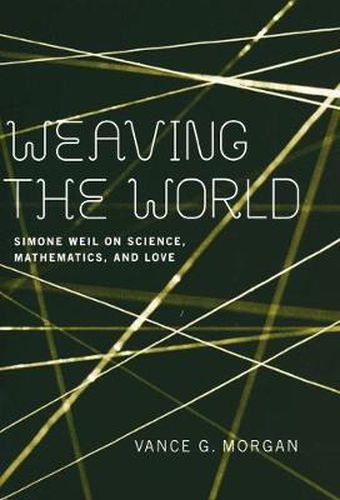Readings Newsletter
Become a Readings Member to make your shopping experience even easier.
Sign in or sign up for free!
You’re not far away from qualifying for FREE standard shipping within Australia
You’ve qualified for FREE standard shipping within Australia
The cart is loading…






This title is printed to order. This book may have been self-published. If so, we cannot guarantee the quality of the content. In the main most books will have gone through the editing process however some may not. We therefore suggest that you be aware of this before ordering this book. If in doubt check either the author or publisher’s details as we are unable to accept any returns unless they are faulty. Please contact us if you have any questions.
Weaving the World uses Simone Weil’s philosophy of science and mathematics as an introduction to the thought of one of the most powerful philosophical and theological minds of the twentieth century. Weil held that, for the ancient Greeks, the ultimate purpose of science and mathematics was the knowledge and love of the divine. Her creative assimilation of this vision led her to a conception of science and mathematics that connects the human person with not only the physical world but also the spiritual and aesthetic aspects of human existence.
Vance G. Morgan investigates Weil’s earliest texts on science, in which she lays the foundation for a conception of science rooted in basic human concerns and activities. He then tracks Weil’s analysis of the development of science, particularly of the mathematics and science of the ancient Greeks. He especially explores Weil’s interpretation of the Pythagoreans and their mathematical discoveries, giving special attention to the mathematical foundations of musical harmonies. Morgan pays particular attention to Weil’s analysis of Greek geometry, which she believed reveals the importance of mediation between incommensurates in both geometry and the larger scope of human existence.
Morgan’s study not only challenges the metaphysical and spiritual poverty of contemporary scientific paradigms, but also sketches an outline of an alternative metaphysical foundation for mathematics and science that, according to Weil, opens the door to a reinvigorated dialogue between science, philosophy, art, and religion.
$9.00 standard shipping within Australia
FREE standard shipping within Australia for orders over $100.00
Express & International shipping calculated at checkout
This title is printed to order. This book may have been self-published. If so, we cannot guarantee the quality of the content. In the main most books will have gone through the editing process however some may not. We therefore suggest that you be aware of this before ordering this book. If in doubt check either the author or publisher’s details as we are unable to accept any returns unless they are faulty. Please contact us if you have any questions.
Weaving the World uses Simone Weil’s philosophy of science and mathematics as an introduction to the thought of one of the most powerful philosophical and theological minds of the twentieth century. Weil held that, for the ancient Greeks, the ultimate purpose of science and mathematics was the knowledge and love of the divine. Her creative assimilation of this vision led her to a conception of science and mathematics that connects the human person with not only the physical world but also the spiritual and aesthetic aspects of human existence.
Vance G. Morgan investigates Weil’s earliest texts on science, in which she lays the foundation for a conception of science rooted in basic human concerns and activities. He then tracks Weil’s analysis of the development of science, particularly of the mathematics and science of the ancient Greeks. He especially explores Weil’s interpretation of the Pythagoreans and their mathematical discoveries, giving special attention to the mathematical foundations of musical harmonies. Morgan pays particular attention to Weil’s analysis of Greek geometry, which she believed reveals the importance of mediation between incommensurates in both geometry and the larger scope of human existence.
Morgan’s study not only challenges the metaphysical and spiritual poverty of contemporary scientific paradigms, but also sketches an outline of an alternative metaphysical foundation for mathematics and science that, according to Weil, opens the door to a reinvigorated dialogue between science, philosophy, art, and religion.